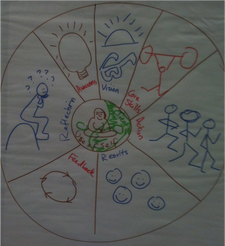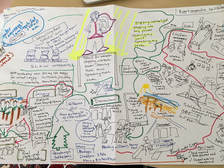Mission: Impact podcast & blog
Build a better world without becoming a martyr to your nonprofit cause
Listen on:
|
The new year is often a time that nonprofit professionals step back and think about where they are in life. This is a good time to look back and think about what the year has brought you, what you have learned, what you have achieved. And what your hopes, dreams and intentions are for the coming year. Developing a Practice I have a weekly reflection practice that I developed and have practiced over the past five years. It gives me rich material to review at the beginning of the year to answer those questions. This practice came out of my experience at graduate school. I consider myself a life long learner. Yet the reflection we had to write after writing every paper was the bane of my existence. Too often I wrote it in the last 20 minutes before the submission midnight deadline. Deep reflections they were not. Reflection mandala My graduate cohort was prepping to go on our international residency to South Africa. We were discussing what would support us as we worked with our clients. Through a variety of visioning exercises, we culled our conversation into a few key concepts:
I saw these as all interrelated and remembered David Sibbet’s work on visual meetings and how mandalas demonstrate unity and holistic thinking. I then built on a set of daily reflection questions I had come across, adapting it and using these major topics as a framework. Download the tool for your own use. Adding a layerI began using it regularly through my work to set intentions as well as observe what I was learning as I went along. Because it is structured and now a regular practice, it makes reflection do-able for this reluctant reflector. With this habit established, I then added another layer. At the six-month and year-end mark, I review my weekly reflections and look for insights and themes. I use different categories on large 11” x 17” paper to capture what strikes me as I review what I have written. These are:
Seeing the patterns Even though I am no artist, I have also sketched the journey of the year. What were the twists and turns? Ups and downs? Significant events and memories? How did the year feel? What have I learned? And what will I do as a result of that learning? With that in mind, what is my vision for the week ahead, months ahead, year ahead. What is yours? Need help getting started? Get in touch with me for a complementary coaching session that can help you reflect on where you are and what your intentions are for the year.
 I allowed myself to take a break yesterday. I had been traveling for a chunk of the week and felt weary. My body and mind were telling me I needed a pause. Yet our go go culture abhors the break. When you are at your job and you are not being super productive instead of encouraging people to listen to your body and take a break, most work cultures want you to power through. Or at least pretend you are busy. Busy Bragging Rights Powering through was what I have done most of my life. I’ve played the “I’m more busy than you” game. I remember the one-up manship as early as when I was in college. ‘Oh geez got a paper due tomorrow and I haven’t started.” “Oh you think that is bad – I have a paper due and a test tomorrow.” And it continues – the endless cycle of bragging who is more overwhelmed by work. Multiple articles and studies have been done recently on the idea that busyness is a new status symbol. “I am a very busy and important person – you have two minutes to make your pitch.” I spent much of my teens and twenties sleep deprived. I’m not interested in winning this game any more. Recharging And today I just proved it doesn’t work anyway. After just 24 hours of a little rest and relaxation, I came back to my to do list fired up and moved through it with ease. I got more done today than I have in a while. And certainly more than if I had plodded through yesterday which would have spilled over into plodding through today. We are not machines A work ethic is critical. Yet lots of science is demonstrating that through our economy is made for machines – we have to remember we are actually NOT machines. In addition, much work today is now knowledge work that requires creativity and innovation. These require white space. They require all the things you were either told not to do growing up – day dreaming, for example. Or the things that weren’t necessarily valued - time away from work – play – time in nature. I don’t need to go to Arianna Huffington’s extreme of collapsing from exhaustion to agree with her assertion that our constantly busy ethic is killing us. Is rest just to make you more productive? At the same time, my argument is a little perverse – or at least still representative of our culture. My reason for a pause is to recharge to be able to get back to work and be more productive. I would call myself a recovering ‘productivity-a-holic.’ I can aspire to relaxing into taking a pause for the sake of taking a pause, rather than to just make me more productive later.
|
Archives
May 2024

Grace Social Sector Consulting, LLC, owns the copyright in and to all content in and transcripts of the Mission: Impact podcast, as well as the Mission: Impact blog with all rights reserved, including right of publicity.
|
Telephone301-857-9335
|
info[at]gracesocialsector.com
|
Grace Social Sector Consulting, LLC, owns the copyright in and to all content in, including transcripts and audio of the Mission: Impact podcast and all content on this website, with all rights reserved, including right of publicity.
|